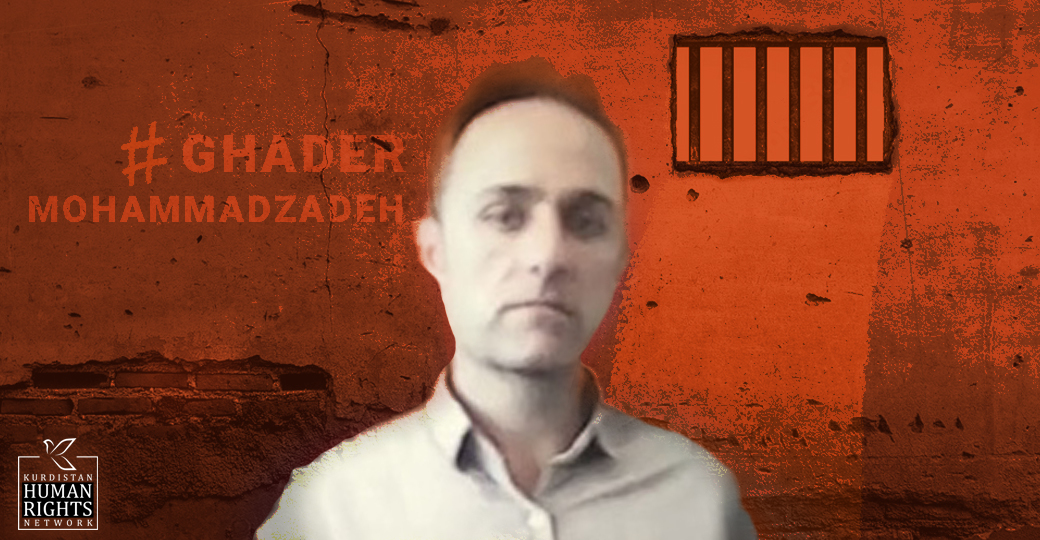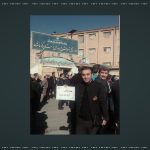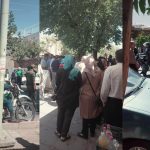Arrest
Ghader Mohammadzadeh was arrested along with Mohammad Amin Abdollahi by security forces in Bukan, West Azerbaijan Province, on 20 December 2005.
After several months of being held in harsh conditions in solitary confinement cells at the Ministry of Intelligence detention centres in Mahabad and Orumiyeh in West Azerbaijan Province, where they were subjected to pressure and torture aimed at extracting forced confessions, the duo were transferred to Orumiyeh Central Prison.
Judicial Process
In March 2007, Mohammadzadeh was tried in Branch One of the Islamic Revolutionary Court of Mahabad and sentenced to 20 years of imprisonment with exile to Yazd Prison on charges of “enmity against God” (moharebeh) through membership in the Komala Party of Iranian Kurdistan.
The trial was conducted without the presence of his chosen lawyers, and they were not even allowed to review the case file.
The sentence was later upheld by the West Azerbaijan Province Court of Appeals.
Additionally, the Mahabad Criminal Court convicted Mohammadzadeh of “premeditated murder” and sentenced him to death and seven years in prison under the Islamic law of qisas, or retribution-in-kind, which gives the victim’s family the right to retaliate.
This sentence was overturned by the Supreme Court in 2013 and converted to payment of blood money.
In February 2011, in a separate case, he was sentenced to an additional six months of imprisonment by the Branch One of the Islamic Revolutionary Court of Mahabad for “propaganda against the state” by communicating with foreign media.
Current Status
Mohammadzadeh was sent on leave for the first time on 15 March 2022, after 17 years of imprisonment, and there has been no information about his condition since.
Additional Information
– In February 2010, along with Mohammad Amin Abdollahi, he published a letter of complaint from prison detailing their suffering.
– On 13 August 2010, he was punitively transferred to the quarantine section of Orumiyeh Central Prison.
– On 22 February 2011, he was transferred from Orumiyeh Central Prison to an undisclosed location.
– On 3 April 2012, he was placed in solitary confinement in Orumiyeh Central Prison.
– In March 2014, he was assaulted by a non-political prisoner in Ward 4 of Orumiyeh Central Prison.
– On 27 July 2014, he was transferred to solitary confinement in Orumiyeh Central Prison.
– On 12 June 2018, he was punitively transferred to solitary confinement in Orumiyeh Central Prison and went on hunger strike.
– On 20 February 2019, along with 30 other prisoners, he was punitively transferred to the “secure” ward on the orders of judicial authorities for allegedly violating prison regulations and was denied family visits for an extended period.
– On 17 March 2019, he was transferred from Orumiyeh Central Prison to Yazd Central Prison for the execution of his exile sentence, but the authorities at Yazd Prison initially refused to accept him due to a lack of coordination.
– On 7 April 2019, he was transferred to Yazd Central Prison for the execution of his exile sentence.
– On 16 October 2019, he went on hunger strike in protest against disruptions in his case.
– On 31 October 2019, due to his continued hunger strike, he was transferred to solitary confinement on the orders of the head of Yazd Central Prison.
– On 5 November 2019, it was announced that due to his deteriorating health from the hunger strike, he was transferred to the prison infirmary but refused to receive an IV.
– On 21 November 2019, he ended his hunger strike following positive assurances from prison officials.
– On 31 July 2021, he went on a hunger strike in protest at not being granted leave, despite having posted the required bail.
– On 8 September 2021, he ended his hunger strike after 39 days. Due to his deteriorating health from the prolonged strike, the head of Yazd Prison and representatives from the Ministry of Intelligence and Yazd Prosecutor’s Office met with him separately, urging him to end his strike. They promised to address his request for leave and consider the possibility of parole, as he was in his 16th year of a 20-year sentence.
Notes:
1. Article 279 of the Islamic Penal Code: “Moharebeh (enmity against God) is defined as drawing a weapon with the intention of killing, stealing from, or intimidating people in a way that causes insecurity in the environment.” According to Article 282 of the Islamic Penal Code, “if a person commits the crime of moharebeh, they will be sentenced to crucifixion, execution, amputation of the right hand and left foot, or exile, at the discretion of the judge.”
2. Komala Party of Iranian Kurdistan: The Komala of Revolutionary Toilers of Iranian Kurdistan, known as Komala, a Marxist-Leninist organisation with Maoist inclinations, after nearly a decade of clandestine activities, publicly declared its establishment on 15 February 1979, simultaneously with the victory of the 1979 revolution.
In 1984, Komala and several other leftist Iranian groups founded the Communist Party of Iran (CPI), and Komala was renamed to Komala Kurdistan’s Organisation of the Communist Party of Iran.
In 2000, part of the party’s leadership and members, under a project entitled “Reviving Komala,” split from the CPI and reverted to their original name before the formation of the CPI; the Komala of Revolutionary Toilers of Iranian Kurdistan or Komala Party of Iranian Kurdistan.
The Komala Party of Iranian Kurdistan believes in social democracy and considers “establishing a federal government” the appropriate solution for the Kurdish issue in Iran. The central headquarters of this party is in Sulaymaniyah, Kurdistan Region of Iraq.
3. Article 500 of the Islamic Penal Code: “Anyone who engages in propaganda activities against the Islamic Republic of Iran or in favour of groups and organisations opposing the state, in any manner, shall be sentenced to imprisonment for a period of three months to one year.”









